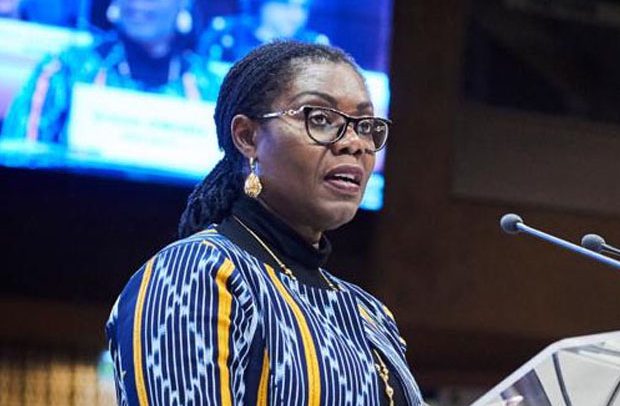Ursula Owusu-Ekuful
Ghana’s Minister of Communications and Digitalization, Mrs. Ursula Owusu-Ekuful has stated that, the country’s addition as Member State of the Digital Cooperation Organization (DCO) will help share knowledge and cooperate on fostering thriving digital economies for prosperity and faster growth.
“I look forward to a future of a bridged digital divide, affordable digital user devices, interpretable content for indigenous people to impact the growth of digitalization and easy access to information. I believe our membership of DCO will enable us achieve this faster, working in partnership with, learning from and sharing the experiences of our member states and observers. Ghana is committed to DCO because cooperation promotes economic growth through coordinated economic and social development programmes” she made it known when commenting on the announcement of Ghana as part of the DCO.
H.E. Deemah AlYahya, Secretary-General of the DCO on her part said: “I am very pleased to welcome the Republic of Ghana to the DCO. Ghana is one of the leaders among African nations in adopting new technology and in the wise use of policies, such as its Digital Finance Policy, that support new areas of development and bring positive benefits to the community. The DCO was created to encourage knowledge sharing and exchange for the good of all nations, and I believe that Ghana has many lessons to share with the DCO and our ecosystem of nations.”
Ghana’s addition to DCO is to make the international mission realize its digital prosperity for all.
Ghana becomes the twelfth nation to ascend to the DCO, an international organization that was founded to support countries to build their digital economies as an essential driver of sustainable growth and development.
Ghana is well-established as a leader in utilizing the power of communications and digital technologies to support economic growth.
Ghana was the first country in sub-Saharan Africa to launch a cellular mobile network in 1992, and one of the first countries in Africa to be connected to the internet and to introduce ADSL broadband services.
Ghana is also a leader in digital payments and mobile money, with the second-highest data penetration rate and fastest-growing mobile money market in sub–Saharan Africa which has greatly enhanced financial inclusion. As the newest member of the DCO, Ghana will now bring that experience and expertise to share with the other Member States.
About DCO
The DCO is a global multilateral organization founded in November 2020 that aims to enable digital prosperity for all by accelerating the inclusive growth of the digital economy.
The DCO brings together the Ministries of Communications and IT of 12 nations – Bahrain, Cyprus, Djibouti, Ghana, Jordan, Kuwait, Pakistan, Oman, Nigeria, Rwanda, Morocco, and Saudi Arabia. – that collectively represent nearly $2 trillion in GDP and a market of nearly 600 million people, more than 70% of whom are under the age of 35.
The DCO is focused on empowering youth, women, and entrepreneurs, leveraging the accelerative power of the digital economy and leapfrogging with innovation to drive economic growth and increase social prosperity.
Through cooperation, dialogue, and the creation of mutually advantageous cross-border legislation, we seek to establish within our member nations the optimal infrastructure and policies for the rapid creation of inclusive and equitable digital economies within which all people, businesses, and societies can innovate and thrive.
In pursuit of our members’ common interests – for example, in the areas of digital skills training, data protection, intellectual copyright, regulation, taxation, and entrepreneurship – DCO works collaboratively with governments, the private sector, international organizations, NGOs and civil society to enable more inclusive digital transformation and the growth of digital industries.
The DCO’s key initiatives include programs to enhance cross-border data flows, promote market expansion for SMEs, empower digital entrepreneurs and advance digital inclusion among women and youth, and other underrepresented populations.


